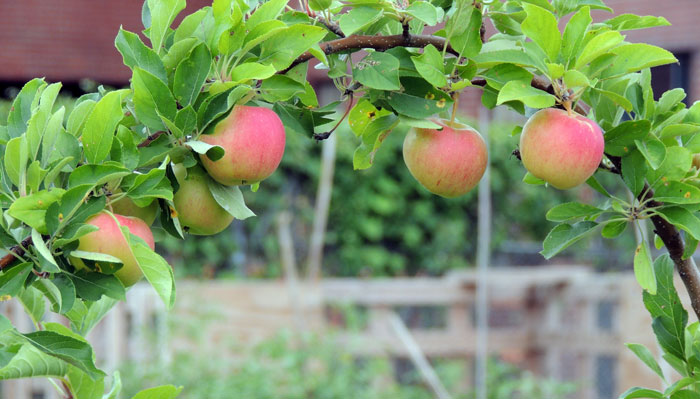Update: A Place to Grow
The International Institutes’ Global Farm Program is nurturing sustainable and
diverse communities.
This article is 12 years old. It was published on August 8, 2013.

Update:
Recently, St. Louis' Mosaic Project and the International Institute gained national coverage for their work in immigration and training. CNN’s Anderson Cooper 360º produced a video piece highlighting their work and success stories. The video segment can be viewed below.
Original Post:
The world is becoming a richly, smaller place, with many roots being transplanted to St. Louis. With organizations like the St. Louis Mosaic Project and the International Institute, many refugees and immigrants are now calling St. Louis home.
"The thing with welcoming immigrants is that they are more likely to be entrepreneurs, inventors, it really enriches the entire community," says Kathleen Delpha, Sr. VP for Finance and Business Development Services at the International Institute. Many of the refugees come from agricultural countries such as Burundi, Bhutan, Burma, Kenya and Somalia. "Our Global Farms Program is teaching refugees how to grow organically and sustainably in the St. Louis climate."
 The program is celebrating its third year with two teaching/ production farms and a third in development. Two are located on the North Side at Hodiamont and Plymouth Ave. and are leased through the Land Reutilization Authority's (LRA) Garden Lease Program. "It's great to see LRA lots looking like this," says Delpha. The South Side farm on Folsom in the Botanical Gardens Neighborhood is leased through the Garden District Commission.
The program is celebrating its third year with two teaching/ production farms and a third in development. Two are located on the North Side at Hodiamont and Plymouth Ave. and are leased through the Land Reutilization Authority's (LRA) Garden Lease Program. "It's great to see LRA lots looking like this," says Delpha. The South Side farm on Folsom in the Botanical Gardens Neighborhood is leased through the Garden District Commission.
Each farmer is provided seeds, tools and instruction on the best growing practices. A Native American farming tradition called The Three Sisters is one of the techniques taught. This is the practice of inter-planting corn, beans and squash in the same mounds, providing a sophisticated, sustainable system that supports long-term soil fertility.
 Sometimes, farmers plant seeds from their native country on the farms. One such plant making a poplar showing is called Roselle; a species of Hibiscus native to the more tropical climates. "People eat it all over the world, except in the U.S. One of the things that the farmers do is grow food that they're used to eating and that they can't readily find locally. We're creating a market for Roselle here in St. Louis," says Delpha. "Earlier this month, Rachel Brown; an Institute intern, and I took a huge bowl of Roselle to Whole Foods and gave out samples as part of their One Dime at a Time Program. I'd say that, out of more than 100 people who tried it, only 2 didn't like it."
Sometimes, farmers plant seeds from their native country on the farms. One such plant making a poplar showing is called Roselle; a species of Hibiscus native to the more tropical climates. "People eat it all over the world, except in the U.S. One of the things that the farmers do is grow food that they're used to eating and that they can't readily find locally. We're creating a market for Roselle here in St. Louis," says Delpha. "Earlier this month, Rachel Brown; an Institute intern, and I took a huge bowl of Roselle to Whole Foods and gave out samples as part of their One Dime at a Time Program. I'd say that, out of more than 100 people who tried it, only 2 didn't like it."
After completing the program at Global Farms, the refugees who wish to make farming their career will be eligible to apply for a loan from the International Institute Community Development Corporation to lease or buy their own land for farming. "We are teaching them how to get LRA lots through the Garden Lease Program. We also have a lawyer from Legal Services of Eastern Missouri working with them to help them understand how to incorporate and what kinds of things they need to consider when entering into a partnership or some type of business entity. We're in that exploratory stage of seeing how much land they need, what is available and searching for contiguous LRA lots," explains Delpha.
The Global Farm not only provides the new farmers with valuable skills, but helps to supplement their income and provide fresh produce to their families and St. Louis City. The Global Farms' Farmers Market opened on the north side in July and is called the West End Farmers Market. Located on Hamilton on the parking lot of the Etzel Place Community Center, it is open every Saturday morning from 10 am – 2 pm. Try the Roselle.
-
Department:
Land Reutilization Authority
-
Topic:
Immigration and Nationality
Photo Gallery
Element PGIMAGE_01 is undefined in a CFML structure referenced as part of an expression.Most Read News
- Mayor Cara Spencer Takes Office as the 48th Mayor of St. Louis She emphasized that better days are ahead for St. Louis and pledges to work collaboratively with all stakeholders
- CDA Announces more than $16 Million Available in 2025 Neighborhood Transformation Grants Funding includes CDBG, HOME, HOME-ARP, PRO Housing, and Economic Development Sales Tax investments to support affordable housing production, neighborhood plan implementation, and community green activation of vacant lots.
- New Data Show St. Louis City Continues To See Decrease in Homicides and Other Crime Newly released crime data for August 2024 shows that the City of St. Louis continues to successfully decrease the amount of crime, including homicides, occurring in the City.